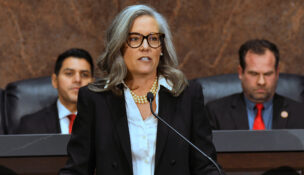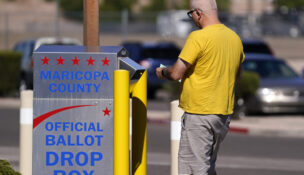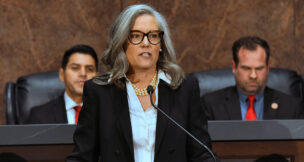Republicans bring back rejected ballot measure as new bill
Reagan Priest Arizona Capitol Times//January 17, 2025//
Republicans bring back rejected ballot measure as new bill
Reagan Priest Arizona Capitol Times//January 17, 2025//
Despite voters rejecting Proposition 315 during the November election, Republicans in the Legislature are bringing the ballot measure back as a newly introduced bill.
Rep. Matt Gress, R-Phoenix, introduced House Bill 2276 Jan. 15, which features the same language as the legislative referral that led to Prop. 315. That ballot measure would have required legislative approval for regulatory rulemakings that increased regulatory costs by $500,000 over five years, but 53% of Arizona voters voted against it.
Gress said he brought the proposed policy back via HB2276 because “government overreach and government overregulation is a problem” and he thinks most Arizonans agree with that.

“I’m going to blame the length of the ballot for why it failed, and not so much as the policy that we sought to propose,” Gress said.
Voters rejected 7 of the 11 ballot referrals legislative Republicans sent to them. Gress cited confusing descriptions of ballot measures as a possible reason voters rejected Prop. 315 and said he doesn’t think it’s too early to revisit the policy.
“Just because something fails at the ballot doesn’t mean that you can never revisit the issue,” Gress said. “What if the Abortion Access Act had failed at the ballot? Would that mean that people would still not be pursuing abortion access laws?”
Gress’ bill features the same language as the resolution introduced by former Republican Sen. Anthony Kern in 2024 that ultimately made it to the ballot. Kern ran the idea as a legislative referral after Democratic Gov. Katie Hobbs vetoed his original bill.
“This would create an unnecessary burden on state agencies that would inhibit their ability to carry out duties in a timely manner,” Hobbs wrote in her April 2024 veto letter for Senate Bill 1153.
Melinda Iyer, the co-founder of Civic Engagement Beyond Voting, said she was “shocked but not surprised” to see the proposition come back.
“Falling back on the length of the ballot or voter confusion is arrogant,” Iyer said. “It’s saying I know better than my own constituents, and that’s not what we send people down there to do. They are our representatives, they’re supposed to represent our views and our views in this instance are clear.”
Arizona law does protect voter-approved ballot measures from being vetoed by the governor or repealed by the Legislature, under the Voter Protection Act. But that law, passed via ballot measure in 1998, does not extend to voter-rejected propositions.
Gress said he thinks that is a good thing, given that public opinion can change over time.
“I certainly think that each year is different and the day after the election is a brand new day, and public sentiment changes throughout a year,” Gress said. “We have new people moving to the state every day that have their own view of how Arizona should be run. So, things aren’t really set in stone, in my view.”
However, Iyer said she thinks bringing back legislation that was vetoed by the governor and rejected by voters is not a good use of a lawmaker’s time.
“We sent [Gress] to the Capitol to work on the issues facing Arizonans, and trying to relitigate this rejected issue seems like a waste of everyone’s time,” Iyer said.
Will Humble, a former director of the Dept. of Health Services, was a vocal opponent of Prop. 315 and called HB2276 “a statement bill.”
“This is a message to say we don’t trust the executive branch with their decisions, because [the governor is] a Democrat,” Humble said.
He said agencies are already required to do economic impact evaluations of proposed rules before they can be approved, making a legislative review redundant. Humble also pointed out that the Legislature created a committee in 2009 – the Administrative Rules Oversight Committee – that it could use to review agency rules but it has since remained dormant.
Hobbs’ office does not comment on bills making their way through the Legislature, but given Kern’s bill fell victim to her veto stamp, it’s likely Gress’ will as well.
“We’ll see how the legislative process plays out,” Gress said. “But I think it’s a great bill, and should be enacted into law.”


















